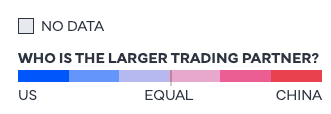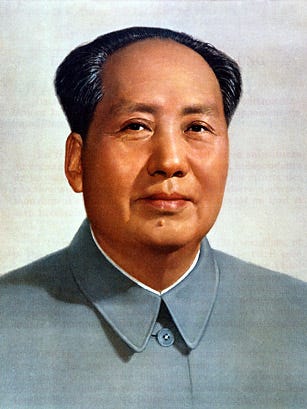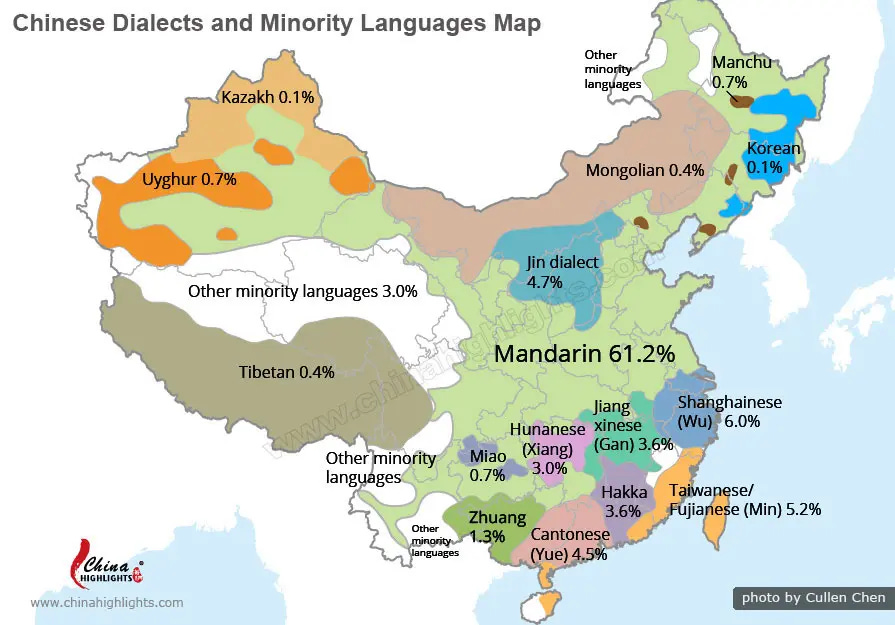We were raised with America being the most important and powerful country in the world. Not only can we name every US president of the last 30 years, but most of us can also name their wives and possibly some of their children too. We are familiar with all of the American states, and traditions like the Superbowl and Thanksgiving. We are enamoured with the Land of the Free and the Home of the Brave.
But as you know, China’s emergence as a global superpower is setting the stage for an epic battle of the titans. Who knows, in 10 – 20 years, China may indeed be the new America. Take global trade, for example, where China has already overtaken the US as the largest trading partner for over half of the world.
2000
2010
2018
Source: How China Overtook the U.S. as the World’s Major Trading Partner, Visual Capitalist
But how much do we know about this evolving behemoth in comparison to America? How familiar are we with its culture, history and politics? To find out, I invite you to participate in the China 101 Quiz.
If you like, please post your score (out of 10) in the comments section. A score higher than 5 is impressive. I didn’t even pass my own quiz.
Questions (answers below)
What’s the name of China’s leader?
What’s the name of his predecessor?
What’s the name of China’s ruling party?
Four of the 20 largest cities in the world are in China. What are their names?
What’s the name of China’s currency?
What is the most spoken language in China, and how do you say hello in this language?
What is the 2021 Chinese Zodiac?
Who was Puyi?
What happened at the Nanjing massacre, aka the rape of Nanking?
Who is this man?
Answers
*You can give yourself a point if you provided the answer in bold.
Xi Xinping has been president of the People’s Republic of China since 2013 and is married to Peng Liyuan, a famous folksinger. They have a daughter, but her father (with help from the state) strictly protects her privacy.
Hu Jintao (2003 – 2013).
The Chinese Communist Party (CCP) has had sole control of the Chinese government since 1949.
Shanghai (27m), Beijing (20m), Chongqing (16m), Tianjin (13m). Even a city like Wuhan, which most people had never heard of before Covid, is almost London's size.
China’s official currency is the renminbi (RMB), more commonly known internationally as yuan (CNY;¥), the renminbi’s unit of account used for pricing. To illustrate, the British equivalent is the pound sterling (renminbi) and the pound (yuan). You get a mark if you answered either yuan or renminbi.
The official language is Mandarin, and it is spoken by approximately 70% of the country. Hello in Mandarin is nǐ hǎo (你好). The language landscape is complex, with different languages and dialects across the country. In Macau or Hong Kong, for example, the official language is Cantonese.
Chinese New Year (Lunar New Year) is China’s biggest holiday and falls on the second new moon after the winter solstice on 21 December. Each year is assigned a zodiac that repeats in 12-year cycles. In order, they are the Rat, Ox (this year), Tiger, Rabbit, Dragon, Snake, Horse, Goat, Monkey, Rooster, Dog, and Pig. Each animal is associated with personality traits. The Ox, for example, is diligent, dependable, strong and determined. These are the New Year traditions.
After 2000 years of imperial rule, China became a republic in 1912 when the Chinese Revolution led to the fall of Puyi, the last Chinese emperor. Puyi was only six years old at the time, and was a member of the Qing Dynasty that ruled from 1644 to 1912. Puyi’s life was depicted in the movie The Last Emperor.
While Europe was preparing for the Nazis, Japan invaded China as part of the Sino-Japanese War that preceded World War II. In 1937, the Imperial Japanese Army captured and obliterated the city of Nanking (now Nanjing). During this siege, Japanese soldiers killed an estimated 300 000 people (mostly civilians) and raped between 20 000 and 80 000 women. Few people know that China suffered 20 million deaths during World War II. Second only to the Soviet Union and almost three times that of Germany.
After the collapse of the Qing Dynasty, rival warlords fought for power, only to be replaced by a feud between the Kuomintang (Chinese National Party) and the Chinese Communist Party, led by Mao Zedong. The strife between the Communists and Nationalists culminated in the Chinese Civil War (1945 - 1949) following World War II. Having led the Communists to victory, Mao founded the People’s Republic of China in 1949*. To transform China’s economy, Mao initiated the “Great Leap Forward” (1958-1962), an audacious plan to increase industrial and agricultural production. Private farming was forbidden, and peasants were forced into labour. The programme was a disaster and caused one of the largest famines in human history, resulting in more than 40 million deaths. This was followed by the “Cultural Revolution”, a decade long political campaign to purge capitalist thinking and traditional Chinese influences. 1.5 Million people were killed during the Cultural Revolution that ended with Mao’s death in 1976.
*Side note: Following Communist victory, the Nationalists fled to Taiwan and created a government there, planting the seeds of tension between Taiwan and China that exist to this day. The same applies to Tibet that suffered Communist invasion in 1950, forcing the Dalai Lama into exile.
Before researching this topic, I was unaware of the level of hardship China’s people have endured during the last century. This provides some perspective on their relentless drive and sometimes seemingly ruthless actions to achieve their goals.
To consider ourselves as worldly and better understand geopolitics, we must do more to familiarise ourselves with this powerhouse of over 1 billion people with a culture and history very different from that of the West. If you scored highly on the quiz, then well done; you are a few steps ahead of most of the western world.
Have a great weekend. See you next week.
Did you enjoy this newsletter? If so, subscribe below for a weekly dose of wisdom sent straight to your inbox (for free!).












Sunday afternoon in CT... and you have made me cleverer (more clever). Thanks for the 🇨🇳 nuggets
I have enjoyed this content so much Robert. A lot of research and relevant information. Look forward to every block!